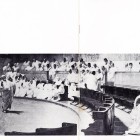Boris Godunov 1974Scottish Opera
Read more about the opera Boris Godunov
This was the final run for Michael Geliot's production, originally mounted in 1965. It was still sung in English, in Musorgsky's original score without the Polish Act. David Ward returned to sing some performances of the title role, which he had recently given in Italian at Palermo. His reading in English was deeply moving and haunted. Gary Bertini conducted a wonderfully fierce account of the score, with chorus and orchestra in electrifying form. The whole revival was pulled together by David Pountney with a new and highly dramatic lighting design. Instead of the costumes which had previously been borrowed from Covent Garden, the company now borrowed them from Welsh National Opera.
In addition to Ward himself, the cast contained a number of fine performances. A few weeks later, Michael Langdon and Francis Egerton revived their lively interpretations of the renegade monks at Covent Garden, singing the Rimsky version in Russian. Johanna Peters, a less frequent visitor to the Royal Opera House, also performed in that revival, which constituted the final performances of the title role in London by the great Boris Christoff.
William McAlpine returned to sing in Scotland several times through his career, but only sang a short range of parts after Scottish Opera was established. Grigory was one of the best. William McCue also had a role that suited his talents - his reputation as a popular entertainer in Scotland often projected into his lively work in operatic comedies and musicals. However the serious parts in his repertoire, such as Rocco, Hunding, Fiesco and Pimen frequently revealed a depth and seriousness that was highly effective. Emile Belcourt returned with his oily and sinister Shuisky. A further notable highlight was the contribution of John Robertson, who gave a moving and magnetic performance as the scrofulous and palsy-ridden Simpleton.
Scottish Opera's Spring 1974 season
The season opened on 16 March with a single performance at Stirling's MacRobert Centre. This was the World Premiere of a new commission from Iain Hamilton, The Catiline Conspiracy. When the company moved on to its first visit to York, Catiline was joined by the previous season's Merry Widow and the recent compact staging of The Magic Flute. At Sunderland a revival of the 1970 Traviata joined the programme and the ensemble then moved on to Oxford. The Flute was then the only work seen in Perth before the main season opened in Glasgow. In that city, Newcastle, Edinburgh and Aberdeen, the repertoire of Catiline, Merry Widow and Traviata, all of which used the Scottish Chamber Orchestra or its expanded version, the Scottish Philharmonia, was augmented by the two operas that required the services of the SNO - revivals of the 1965 Boris Godunov and 1970 Fidelio.
Performance Cast
- Nikitich a police officer
- Mitiukha a peasant
- Andrei Shchelkalov a Boyar, secretary to the Duma
- Shuisky Prince Vasily Ivanovich Shuisky
- Boris Godunov Tsar of Russia
-
David Ward (May 9, 11, 17, 21)
Don Garrard (May 30; Jun 1 & 7)
- Pimen a monk and chronicler
- Grigory Otrepiev a novice monk
- Hostess at the inn
- Missail an itinerant monk
- Varlaam an itinerant monk
- Xenia Tsarevna daughter of Boris
- Fyodor Tsarevitch son of Boris
- Nurse to Xenia
- Boyar in attendance
- Simpleton
- Lavitsky a Jesuit
- Chernikovsky a Jesuit
- Krushchov a Boyar
- Peasant Woman
Performance DatesBoris Godunov 1974
King's Theatre, Glasgow | Glasgow
9 May, 19.30 11 May, 19.30
Theatre Royal, Newcastle | Newcastle-upon-Tyne
17 May, 19.30
King's Theatre, Edinburgh | Edinburgh
21 May, 19.30 30 May, 19.30 1 Jun, 19.30
His Majesty's Theatre, Aberdeen | Aberdeen
7 Jun, 19.30

